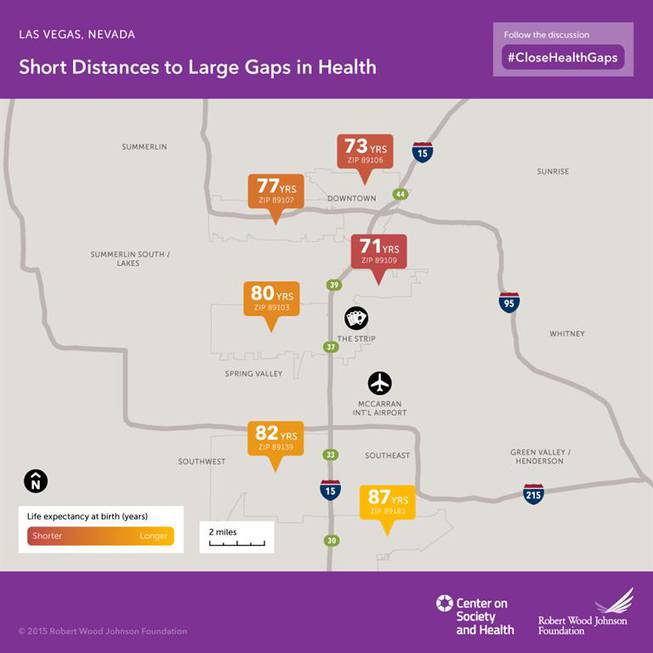
Wednesday, March 4, 2015 | 2 a.m.
When it comes to life expectancy in Las Vegas, several miles can make a huge difference.
A baby born today in southeast Las Vegas might live 16 years longer than an infant born closer to the Strip, according to a study released today by Virginia Commonwealth University’s Center on Society and Health.
Researchers used state death data aggregated by age and compared it with the population in each ZIP code to determine life expectancy. The results suggest that income matters: The more affluent a neighborhood, the longer children born there are likely to live.
Babies born in the suburban southeast valley are projected to live 87 years. Life expectancy is only 71 years nine miles north, near the Strip. In West Las Vegas, life expectancy is 73 years.
“You find tremendous overlay between neighborhoods with low life expectancy and neighborhoods with high poverty,” said Steven Woolf, director of the Center on Society and Health.
Other environmental factors also are at play, including education, housing, food availability, air quality and physical activity, Woolf said.
The Center on Society and Health, with funding from the Robert Wood Johnson Foundation, released similar maps in 2013 for New Orleans; Washington, D.C.; Kansas City, Mo.; Minneapolis and Saint Paul, Minn.; and San Joaquin Valley, Calif. Like Las Vegas, all showed life-expectancy disparities across a few miles. Life expectancy for babies born into two New Orleans neighborhoods, for instance, differed by 25 years.
“It’s not unique to Las Vegas,” said Derek Chapman, associate director of research at the Center on Society and Health. “It’s happening all across America. It really speaks to the need to look into these community factors.”
Las Vegas was one of 20 locations chosen for this year’s mapping project. Other locations include Los Angeles, Chicago, a rural town in Kentucky and border towns in the southwest.
Researchers hope the maps trigger a conversation about how communities can improve health outcomes by looking at policies related to environmental factors.
“Policies have health implications, and we need to come together as a community to form (a) culture of health,” Chapman said.

Join the Discussion:
Check this out for a full explanation of our conversion to the LiveFyre commenting system and instructions on how to sign up for an account.
Full comments policy